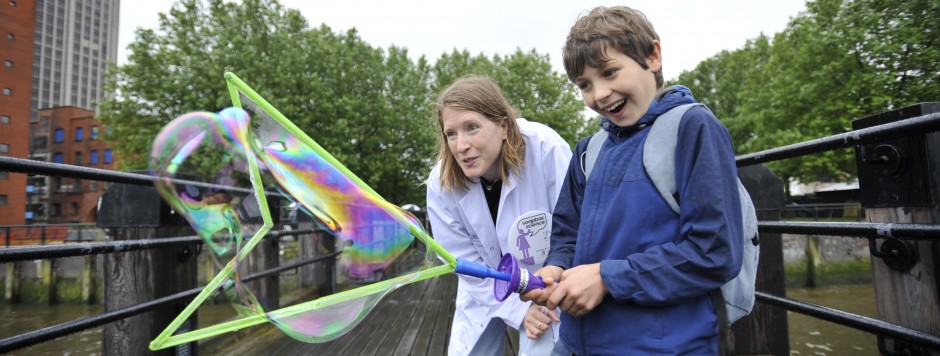 Alice Banks (@alice_banks) is a research associate working at the University of Bristol in the School of Biological Sciences. Her research is in the area of drug discovery and she is working to identify new antibiotics being produced by mushrooms, to tackle the problem of antibiotic resistance. She is currently working as part of the BristolBridge initiative at the University of Bristol which is a multidisciplinary approach to tackling antimicrobial resistance, funded by the Engineering and Physical Sciences Research Council (EPSRC). Alice will be speaking about ‘The Magic of Mushrooms: could mushrooms be the solution to antibiotic resistance?’ at Bristol’s Soapbox Science.
Alice Banks (@alice_banks) is a research associate working at the University of Bristol in the School of Biological Sciences. Her research is in the area of drug discovery and she is working to identify new antibiotics being produced by mushrooms, to tackle the problem of antibiotic resistance. She is currently working as part of the BristolBridge initiative at the University of Bristol which is a multidisciplinary approach to tackling antimicrobial resistance, funded by the Engineering and Physical Sciences Research Council (EPSRC). Alice will be speaking about ‘The Magic of Mushrooms: could mushrooms be the solution to antibiotic resistance?’ at Bristol’s Soapbox Science.
SS: Alice, how did you get to your current position?
AB: I did my undergraduate BSc in Biology at the University of Bristol and as part of the final year of my degree I carried out a short research project to identify different mushrooms which were making antibiotics. This intensive research project was one of my favourite parts of my degree and I knew it was something that I wanted to continue with.
Following my BSc, I spent a year carrying out a Research MSc where I was able to continue aspects of my undergraduate project but in much more depth. This helped me to make up my mind that I wanted to pursue a career in research so I decided to undertake a PhD. My PhD has been working in the area of drug discovery, and I have been looking for new antibiotics produced by mushrooms and working out which genes are responsible for making these antibiotics.
I have recently started working as a research associate at the University of Bristol as part of the BristolBridge initiative, which is a multidisciplinary approach to tackling antimicrobial resistance. I was able to apply to be part of this initiative by proposing a research project based on some of the findings from my PhD, and I was fortunate enough to be awarded funding to carry out this work.
SS: What, or who, inspired you to get a career in science?
AB: I think I have been inspired by many people and experiences over the years but I have always been particularly fascinated by the natural world, and curious to find out how organisms behave and why. At school, I was also encouraged by many supportive science teachers and I was fortunate enough to visit different University science departments on outreach schemes to get a feel for what it would be like to work as a scientist at a University.
SS: What is the most fascinating aspect of your research/work?
AB: I love the potential of what my work is capable of achieving. Antibiotic resistance is a major problem globally. So for me, having the opportunity to contribute to solving this problem is a real privilege. I also love the excitement of being able to discover something completely new!
SS: What attracted you to Soapbox Science in the first place?
I have worked as a STEM ambassador for several years and I feel that it is really important to promote studying science and scientific careers, particularly to young people. Events like Soapbox Science are a great opportunity for the public to hear first-hand from scientists about current research and to ask lots of questions. I also volunteered at the Soapbox Science event in Bristol last year and I thought it was such a fantastic experience that I wanted to come back again this year!
SS: Sum up in one word your expectations for the day – excitement? Fear? Thrill? Anticipation?
AB: Excited!
SS: If you could change one thing about the scientific culture right now, what would it be?
AB: I would like science not to be viewed as isolating, but as something accessible to anyone. That way we should be able to attract as many keen minds as possible into research.
SS: What would be your top recommendation to a female PhD student considering pursuing a career in academia?
AB: Go for it! The scientific community needs more enthusiastic female scientists. Take the opportunity to gain as much experience as possible and ask lots of questions. There are so many different directions a scientific career can take you and it is always fascinating to find out how people have made it to the positions they are in today.
